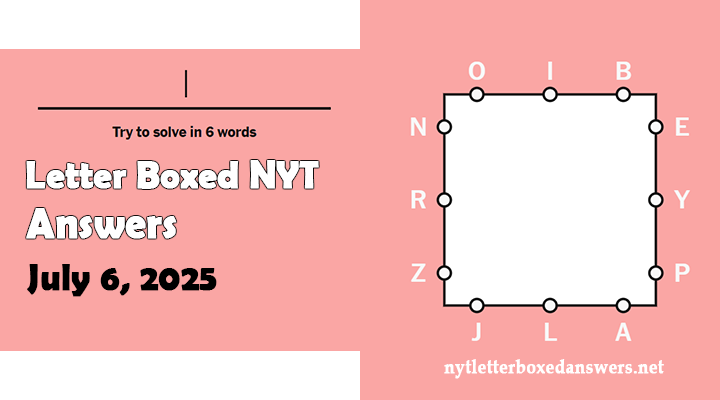NYT Letter Boxed quiz for Sunday July 6, 2025 is released. We came up with Letter Boxed July 6 2025 Answers and Hints for you. With the help of these hints, you will be able to guess the words of letter boxed quiz without revealing the answers and get the solution.
| Top | Right | Bottom | Left |
|---|---|---|---|
| OIB | EYP | JLA | NRZ |
| Two Words Solution | ||
|---|---|---|
| PRIZE | ENJOYABLE | |
| PRIZE | ENJOYABLY | |
| PRIZABLE | ENJOYABLE | |
| PRIZABLE | ENJOY | |
| Three Words Solution | ||
|---|---|---|
| BLIP | PRIZE | ENJOYABLY |
| BRAIZE | ENJOYABLY | YIP |

Word 01:
This 5-letter word starts with P and ends with E; a reward for achievement or excellence.
Given in competitions, games, or academic events.
Can be monetary, symbolic, or honorary.
Includes trophies, medals, or certificates.
May be awarded for bravery or contribution.
Common in raffles, lotteries, and contests.
Highly valued, sought after, or contested.
Appears in phrases like “win the prize” or “prized possession.”
Also used as a verb meaning to value highly.
Can be tangible or intangible recognition.
Word 02:
This 9-letter word starts with E and ends with E; describes something that brings pleasure or satisfaction.
Often refers to activities like reading, traveling, or playing.
A synonym of fun, entertaining, or pleasant.
Opposite of boring or tedious.
Frequently used in reviews or casual speech.
Associated with leisure and happiness.
May describe events, experiences, or food.
Enhances mood and reduces stress.
Implies subjective appreciation or delight.
Rooted in “enjoy” with the adjective suffix “-able.”
Word 01:
This 5-letter word starts with P and ends with E; a reward for achievement or excellence.
Given in competitions, games, or academic events.
Can be monetary, symbolic, or honorary.
Includes trophies, medals, or certificates.
May be awarded for bravery or contribution.
Common in raffles, lotteries, and contests.
Highly valued, sought after, or contested.
Appears in phrases like “win the prize” or “prized possession.”
Also used as a verb meaning to value highly.
Can be tangible or intangible recognition.
Word 02:
This 9-letter word starts with E and ends with Y; adverb meaning in a pleasant or delightful manner.
Describes how an activity is experienced.
Modifies verbs like “spent,” “watched,” or “traveled.”
Derived from “enjoyable” with adverbial ending.
Appears in reflective or narrative writing.
Suggests positive feelings during an action.
May refer to entertainment or social interaction.
Indicates pleasure without extravagance.
Used in personal stories or journal entries.
Often paired with time expressions: “evening was enjoyably quiet.”
Word 01:
This 8-letter word starts with P and ends with E; describes something worthy of a prize or great value.
Means “capable of being prized.”
May be used in literary or elevated language.
Rare in modern conversation but valid.
Associated with excellence or superiority.
Could refer to art, talent, or behavior.
Rooted in the concept of reward-worthiness.
A cousin to “precious” or “treasured.”
Can be both literal and metaphorical.
Used in formal praise or critique.
Word 02:
This 9-letter word starts with E and ends with E; describes something that brings pleasure or satisfaction.
Often refers to activities like reading, traveling, or playing.
A synonym of fun, entertaining, or pleasant.
Opposite of boring or tedious.
Frequently used in reviews or casual speech.
Associated with leisure and happiness.
May describe events, experiences, or food.
Enhances mood and reduces stress.
Implies subjective appreciation or delight.
Rooted in “enjoy” with the adjective suffix “-able.”
Word 01:
This 8-letter word starts with P and ends with E; describes something worthy of a prize or great value.
Means “capable of being prized.”
May be used in literary or elevated language.
Rare in modern conversation but valid.
Associated with excellence or superiority.
Could refer to art, talent, or behavior.
Rooted in the concept of reward-worthiness.
A cousin to “precious” or “treasured.”
Can be both literal and metaphorical.
Used in formal praise or critique.
Word 02:
This 5-letter word starts with E and ends with Y; to take delight or find pleasure in something.
Can refer to food, games, hobbies, or company.
Indicates active appreciation of an experience.
Root of words like enjoyable and enjoyment.
Suggests contentment or satisfaction.
Often used in greetings or farewells: “Enjoy your day!”
May involve the senses or emotions.
Could imply leisure or indulgence.
Common in casual and polite conversation.
Opposite of endure or dislike.
Word 01:
This 4-letter word starts with B and ends with P; a short interruption or minor fluctuation.
Often refers to radar screens or data charts.
Can mean a brief, insignificant event.
Used metaphorically in finance or sports.
Indicates a tiny moment of visibility or change.
May be seen in diagnostic monitors.
Has connotations of unpredictability.
Originates from early electronic feedback.
Suggests something momentary and minor.
Common in tech, aviation, or media contexts.
Word 02:
This 5-letter word starts with P and ends with E; a reward for achievement or excellence.
Given in competitions, games, or academic events.
Can be monetary, symbolic, or honorary.
Includes trophies, medals, or certificates.
May be awarded for bravery or contribution.
Common in raffles, lotteries, and contests.
Highly valued, sought after, or contested.
Appears in phrases like “win the prize” or “prized possession.”
Also used as a verb meaning to value highly.
Can be tangible or intangible recognition.
Word 03:
This 9-letter word starts with E and ends with Y; adverb meaning in a pleasant or delightful manner.
Describes how an activity is experienced.
Modifies verbs like “spent,” “watched,” or “traveled.”
Derived from “enjoyable” with adverbial ending.
Appears in reflective or narrative writing.
Suggests positive feelings during an action.
May refer to entertainment or social interaction.
Indicates pleasure without extravagance.
Used in personal stories or journal entries.
Often paired with time expressions: “evening was enjoyably quiet.”
Word 01:
This 6-letter word starts with B and ends with E; a lesser-known variant spelling of “braise,” meaning to cook slowly in liquid.
Related to slow-cooked, flavorful dishes.
Often involves meat or vegetables.
Cooking method used in stews or pot roasts.
Combines dry and moist heat techniques.
Found in French culinary traditions.
Requires covered cooking vessel.
Infuses food with juices and spices.
Ideal for tough cuts of meat.
Not to be confused with “blaze” or “braid.”
Word 02:
This 9-letter word starts with E and ends with Y; adverb meaning in a pleasant or delightful manner.
Describes how an activity is experienced.
Modifies verbs like “spent,” “watched,” or “traveled.”
Derived from “enjoyable” with adverbial ending.
Appears in reflective or narrative writing.
Suggests positive feelings during an action.
May refer to entertainment or social interaction.
Indicates pleasure without extravagance.
Used in personal stories or journal entries.
Often paired with time expressions: “evening was enjoyably quiet.”
Word 03:
This 3-letter word starts with Y and ends with P; a short, high-pitched bark or cry.
Often made by small dogs or puppies.
May express excitement or alarm.
Also used for squeals or shrieks of glee.
Verb form: “The puppy yipped happily.”
Associated with energy and rapid motion.
Could describe a sharp vocalization.
Sometimes used figuratively for cheering.
Found in cartoons or pet stories.
Sound-related word; similar to “yelp.”

Chris Brown is a passionate word game love and problem solving expert. With over 15 years of experience in solving puzzle challenges, he provides daily NYT Letter Boxed answers, tips and strategies to help other players so that they can improve their solving skills. Whether you are stuck on a tricky puzzle or looking for new techniques, Chris is here to guide you with his expert solutions.